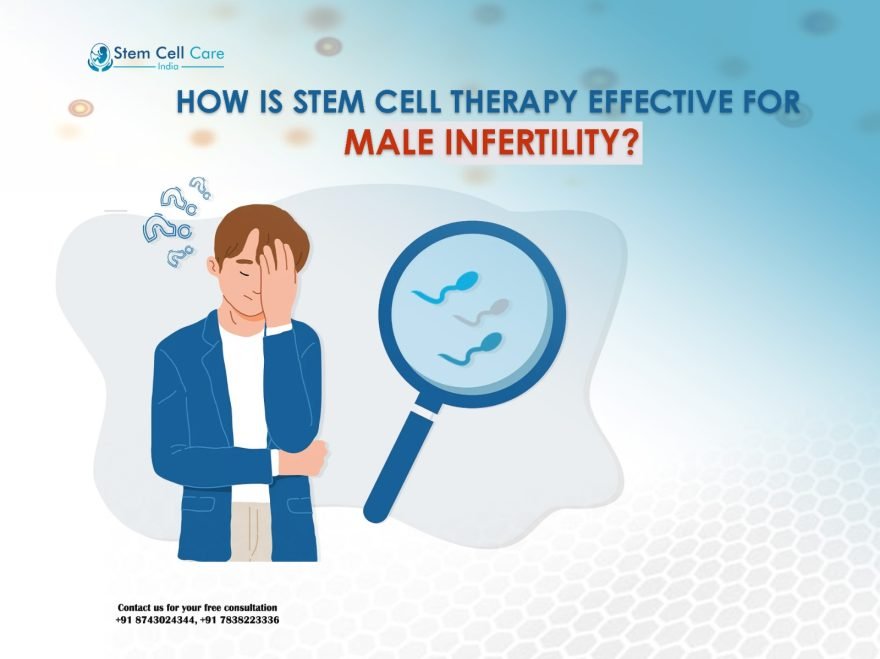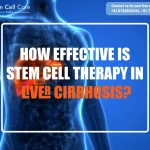Table of Contents
Male infertility can happen in early or late puberty. It can occur due to genital infection, major injury in your testicles, and many more other causes.
But now you can solve this problem or reduce the symptoms with the help of an innovative approach which is known as stem cell treatment for male infertility in India. Stem cells have the regenerative potential to replace the damaged cells with the new one.
In this blog, we discover what male infertility is and how it can be caused. Nowadays everyone knows about stem cell treatment and how it turns the pages of the medical field. But can it be effective for male infertility? Let’s explore the potential of stem cell therapy for male infertility and its mechanism.
What Is Male Infertility and Its Causes?
The disease which can affect the male reproductive system and damage it, so that they cannot make a fertile woman pregnant is known as male infertility. Over 186 million people worldwide suffer from this problem and male infertility is about half of the cases. Infertility in male can be shown from the various factors such as low sperm count, poor sperm mobility, or morphology, hormonal imbalance, and many more. Let’s talk about the causes in brief:
- Low Sperm Count: A leading cause of male infertility, low sperm count (oligospermia) reduces the chances of fertilizing an egg. Factors such as stress, certain medications, and lifestyle choices can contribute to this condition.
- Hormonal Imbalance: Hormonal disruptions, including abnormalities in testosterone, follicle-stimulating hormone (FSH), and luteinizing hormone (LH), can impair sperm production and quality. Conditions such as hypogonadism and thyroid disorders often underlie hormonal imbalances.
- Poor Sperm Mobility (Motility): Sperm motility is crucial for reaching and penetrating the egg. Defects in sperm motility, known as asthenozoospermia, hinder the sperm’s ability to swim effectively towards the egg, impeding fertilization.
- Genetic Issues: Genetic factors play a significant role in male infertility. Chromosomal abnormalities, such as Klinefelter syndrome or Y chromosome microdeletions, can affect sperm production and function.
- Smoking: Tobacco use, including smoking cigarettes or marijuana, has been linked to decreased sperm count, motility, and morphology. Chemicals in tobacco can damage sperm DNA, increasing the risk of infertility and genetic abnormalities in offspring.
But don’t you worry about it. Stem cell therapy Delhi is becoming the new hope for the individuals who are suffering from this condition. Understanding the causes can help you in diagnosis and treatment which empowers individuals and couples facing fertility problems.
Potential of Stem Cell Therapy for Male Infertility
The issue of male infertility affects a lot of people globally hence is a big problem in reproduction. Alternatively, such improvements can be attained through recent breakthroughs on stem cell research. All these conditions are able to be rectified by stem cell therapy which may as well change infertility treatment in males forever to return the reproductive system back to normalcy.
- Regeneration of Spermatogenesis: Stem cells, with their ability to differentiate into various cell types, hold promise for regenerating spermatogenesis. By replenishing or replacing damaged or insufficient germ cells, stem cell therapy can potentially restore fertility in men with impaired sperm production.
- Treatment for Azoospermia: Conventional treatments for azoospermia, a disorder marked by the absence of sperm in ejaculate, are severely hindered. By enabling the generation of fresh sperm cells from stem cells, stem cell treatment gives promise for potentially overcoming this fertility obstacle.
- Addressing Genetic Causes: Male infertility can result from genetic abnormalities affecting sperm production or function. Through the provision of genetically modified sperm cells or a platform for gene editing, stem cells have the ability to address such genetic reasons and enable the restoration of heritable fertility.
- Mitigation of Testicular Damage: Testicular damage due to factors such as trauma, chemotherapy, or radiation therapy can impair fertility. By replacing or repairing damaged testicular tissue, stem cell therapy provides the chance to return normal sperm production and reproductive potential.
- Non-Invasive Approaches: Unlike some invasive fertility treatments, stem cell therapy holds the promise of non-invasiveness. With minimally invasive methods like injections or transplants, stem cells can be given to patients in a way that minimizes discomfort and may even increase effectiveness.
- Personalized Therapeutic Strategies: Stem cell therapy for male infertility in India allows for personalized therapeutic strategies tailored to individual patients. This method reduces the possibility of rejection and improves treatment results by using the patient’s own stem cells or donor cells that have been matched for compatibility.
Mechanism of Stem Cells for Male Infertility
This innovative regenerative medicine treatment uses stem cells’ amazing capacity to self-renew and differentiate into a variety of cell types, offering a viable means of restoring male fertility. Here’s a concise overview of the mechanism underlying stem cell therapy for male infertility:
- Introduction of Stem Cells: Stem cells, sourced from diverse origins such as bone marrow or adipose tissue, are introduced into the reproductive system.
- Differentiation: Within the testes, these stem cells undergo differentiation, transforming into specialized cell types crucial for spermatogenesis.
- Spermatogenesis Support: The differentiated cells provide essential support for spermatogenesis, the process of sperm production, by replenishing the depleted or damaged germ cell population.
- Microenvironment Modulation: Stem cells modulate the local microenvironment within the testicular tissue, creating a conducive milieu for optimal sperm development.
- Tissue Regeneration: Stem cells facilitate tissue regeneration and repair, aiding in restoring normal testicular function disrupted by various factors contributing to infertility.
- Functional Improvement: By targeting underlying problems at a cellular level, stem cell therapy seeks to improve male fertility through these pathways, potentially providing a promising treatment option for infertile couples.
Putting It All Together
Stem cell therapy presents a promising avenue for addressing male infertility by offering regenerative potential to damaged reproductive tissues. Through its ability to promote tissue repair and enhance sperm production, stem cell therapy in India offers hope to individuals struggling with infertility. Further research and clinical trials are warranted to optimize its effectiveness and establish it as a viable treatment option for male infertility.
Stem Cell Care India provides comprehensive care to their patients. You can check our testimonial section which shows how an individual can feel after taking stem cell therapy from us.





